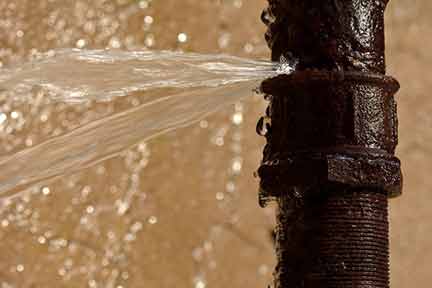
One of the greatest inventions of modern man is our ability to channel water into our homes and make it available at the turn of a faucet. But like most good things, there is another side to the convenience of having water running within the structures of a building.
The opportunities for things to go wrong are many. Water is highly mobile and is such a powerful element that it can weaken almost any material it comes into contact with. This means you are in constant battle with the water flowing through your home’s plumbing, says PropertyPlus USA.
The water is forever breaking down the components of the plumbing and always trying to flow into places you don’t want it to go. You, on the other hand, must be vigilant to replace your plumbing fixtures as soon as they become weak and detect leaks as soon as they happen.
Water leaks are the number one maintenance issue for homeowners in the USA. Every single year, an estimated 1 trillion gallons of water is accidentally discharged into homes across the country. These are from very avoidable plumbing leaks and they cost billions of dollars to fix.
Failure to detect leaks in your plumbing system will cost you and the cost can impact both your financial and physical health. Plumbing leaks will undermine the investment you have made in your home. Leaks can also affect the health of everyone living in the building.
How water leaks damage your health
Water, carbon, and oxygen are the three most important components needed for life to sprout in any environment. Carbon is always present in your home in the form of organic materials. The same is true of oxygen. The only thing missing is water and when this enters the equation, your home can become a breeding ground for harmful molds and fungi.
Mold growth in the home is linked to a long list of ailments. Mold spores and odor (caused by Microbial Volatile Organic Compounds or MVOCs from mold) have been connected to a wide range of respiratory conditions and illnesses, including but not limited to, asthma, allergies, nasal congestion, inflammations, breathing difficulties, bleeding, coughing, and sneezing fits.
Mold also damages the surfaces it grows on because when mold grows on anything, it essentially feeds on that material. This is in addition to how mold hurts the aesthetics of your home by causing discolorations on the surfaces where it grows. Mold also impairs the quality of life of the occupants of the home by attracting pests like roaches into the home.
Effects of water leaks on the structures of your building
The quickest way to destroy a building without actually breaking it down is to subject it to water. In a short span of time, water will break down the building until there is nothing left. Almost every kind of wear and tear that happens in your home involves water. This includes rust, rot, and damage by organic agents.
This is because most of the structures and contents of your home are made from wood, masonry, metals, and fabric. From the paint on your walls, to the concrete in the foundation, and drywall in the entire house, most things in the home are susceptible to water. Uncontrolled release of water in a building is the number one cause of structural and other kinds of damage.
A few of the different types of damage that can result from accidental release of water in your home include sagging ceilings, rotting carpets, peeling wall paint, surface discolorations, weakened or collapsing drywall, damaged flooring, compromised electrical circuits, foundation failure, landscape damage, and broken-down appliances.
Water leaks will destroy the function and appeal of your home until it completely devalues the property.
How to protect your health and home from water leaks
Due to the mobile and highly corrosive nature of water, detecting leaks in the plumbing system requires constant vigilance. Most water leaks cost a lot of money to fix because they are not discovered in time; they are given a chance to do serious damage. Just a tiny 1/8” crack in your pipes can unleash 250 gallons of water into your home in one day.
How do you protect your home and health from water leaks?
- Monitor water pressure – Downward changes in pressure may be due to a leak.
- Monitor your water bill – Inexplicable spikes in your water bill could mean a leak.
- Switch to pex pipes – Unlike copper or PVC, pex pipes are inflatable and don’t leak easily.
- Keep roof gutters in good shape to keep water out of the roof and ceilings.
- Install floor pans under appliances in case they suddenly start to leak.
- Know where your shutoff valves are, so you can easily find them during plumbing emergencies.
- Exposed pipes can be cheaply and effectively insulated with snap-on insulation.
- Keep pipes from freezing by maintaining a constant room temperature with a smart thermostat.
- Install point of leak alarms and water flow monitoring systems in your home.
- Have a professional plumber inspect your home’s plumbing fixtures on a schedule.
